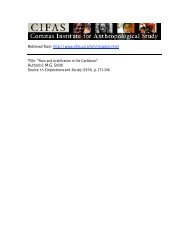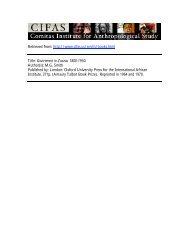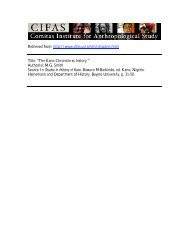Slaves, Free Men, Citizens - CIFAS
Slaves, Free Men, Citizens - CIFAS
Slaves, Free Men, Citizens - CIFAS
- No tags were found...
Create successful ePaper yourself
Turn your PDF publications into a flip-book with our unique Google optimized e-Paper software.
24 Socialization and Personality Structuregeneration creole slaves. Lewis wrote of the strong influenceof an African negress over her mulatto daughter whohaving "imbibed strong African prejudices from hermother* refused to become a Christian.11 Martin also informsus that the Negro population is . . . formed intoclasses, according to the country they came from, or thatwhich their progenitors belonged to'.*THE ADJUSTMENT OF THE AFRICAN SLAVEElkina has described the transformation of the Africantribesman into a New World slave in terms of a series ofshock experiences, namelyupture, journey to the coast,sale to the white captains, the middle passage and enslavementon the plantation.18 Such categorization, while ofsome use, is too schematic, and neglects certain importantfactors. First, many slaves were captured in genuine warfare,and as soldiers, one would hardly expect them to beshocked at being taken prisoners of war. Secondly, manyof the slaves came from the coast itself and were thusspared the horrors of the journey from the interior. Andthirdly, it must be admitted that many of the slaves soldinto slavery were guilty of genuine crimes for which theywould otherwise have been executed. But these reservationsaside, there can be little doubt that most Africanslaves had a terrifying experience, both in the nature oftheir capture, transportation and sale on the coast and inthe West Indies. The Ibo slave, Equiano, has left us a vividaccount of his capture and later experiences.14He was captured when alone with his sister in his familycompound; gagged, tied up and carried to the woods. When11 Lewis, op. cit., p. 335.12R M. Martin, The English Colonies (6 vols.; London.1851-57). Val. 4, pp. 95-96.*sStanley Elkiis, Slavery: A Problem in American tnstituttonaland Intellectual Life (Chicago: University of ChicagoPress, 1963). pp. 98-103.14Olaudah Equiano, The Interesting Narrative of the Lifeof Olaudah Equiano or Gustavus Vors4 the African, Writtenby Himself (2 vols.; London: 1789).OrJando Patterson 25he cried out he was placed in a sack.1' After many dayof travel, he was sold For the next three months he wuresold several times. But he was generally well treated andunderstood the language and customs of his masters.Finally he was sold by a widow to some traders from thecoast. This turned out to be his first real and lasting shockexperience. The change I now experienced', he wrote, "wasas painful as it was sudden and unexpected', involving 'suchinstances of hardship and fatigue as I can never reflect onbut with horror'.l*As he passed through strange countries on his way tothe coast he was forcibly struck by the differing customs,but more, by the new, awe-inspiring natural sights. Thesight of a large river for the first time filled him with astonishmentas he had "never before seen any water than apond or a rivulet*. It was not until the end of seven monthsafter he was first kidnapped that Equiano finally reachedthe coast. The physical confrontation with the sea immediatelyfilled him with sheer terror. No less terrifying was hisexperience of being forced aboard ship; and the strangesight of the white men who came to inspect him, juxtaposedwith that of,a large copper boiling on the ship, convinced16There are a few other clave autobiographies, bat none aivivid as Equianol. A Fanti slave published an autobiographyentitled The Narrative of the Enslavement of Ottobah Cugoano,a Native of Africa, in 1787. Like Equiano, Cngoano was kidnappedwhen still a youth. The technique wed in his cam was 'slightly different, he being duped into going to the coast ratherthan being brutally pulled along. A short autobiography of aJamaican slave is appended in R. R. Madden** Twelve MontAyResidence in the West Indies (2 vols.. Philadelphia, 1835) andis entitled, "The History of Abon Beer Sadika, known in Jamaicaby the name of Edward Doolan." Donlan claimed that he wasfrom Timbuctoo' and could read and write Arabic. Describingthe first stage of his enslavement, he wrote: '& mon as I wasmade prisoner, they stripped me. and tied me with a cord, andgave me heavy load to cany* (VoL 2, p. 129). In 1834 aSenegambian ex-alave published an autobiography entitled SomeMemoirs of the Life of Job, the Son of Solomon, the High Prtestof Boonda In Africa. It includes interesting material on captureand transportation to the coast.l*Eqh, op. dt., VoL I, pp. 65-66.





